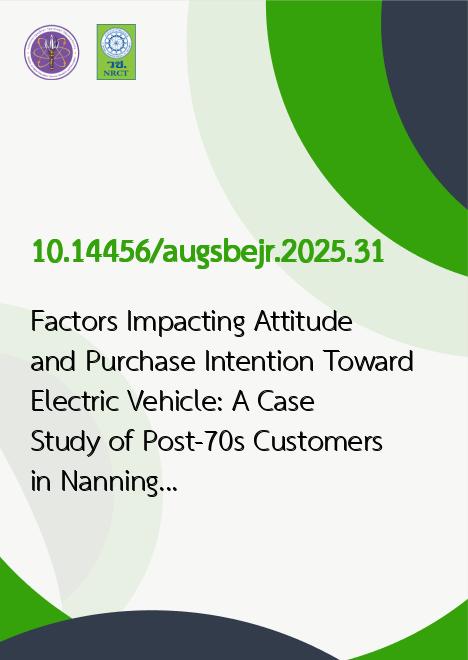
|
Factors Impacting Attitude and Purchase Intention Toward Electric Vehicle: A Case Study of Post-70s Customers in Nanning, China |
|---|---|
| รหัสดีโอไอ | |
| Creator | Haoning Song |
| Title | Factors Impacting Attitude and Purchase Intention Toward Electric Vehicle: A Case Study of Post-70s Customers in Nanning, China |
| Publisher | Assumption University Press |
| Publication Year | 2568 |
| Journal Title | AU-GSB e-Journal |
| Journal Vol. | 18 |
| Journal No. | 2 |
| Page no. | 53-64 |
| Keyword | Consumer Attitude, Consumer Purchase Intention, Environmental Protection, Infrastructure |
| URL Website | https://assumptionjournal.au.edu/index.php/AU-GSB/article/view/8014 |
| Website title | https://assumptionjournal.au.edu/index.php/AU-GSB |
| ISSN | 1906-3296 |
| Abstract | Purpose: This paper focuses on factors impacting attitude and purchase intentions toward electric vehicles for post-70s customers in Guangxi Nanning, China. The primary focus of this paper is to examine the causal relationship between perceived usefulness, perceived ease of use, compatibility, personal innovativeness, environmental consciousness, environmental attitude and attitude toward behavior. Research design, data, and methodology: This paper mainly uses the quantitative research (N=500). A questionnaire was sent to the post-70s population in Nanning, China. Purposive sampling, stratified random sampling, and convenient sampling were used to collect data Index of Item-Objective Congruence (IOC), and Cronbach's Alpha score were used to assess validity and reliability before the data collection. Structural Equation Modeling (SEM) and Confirmatory Factor Analysis (CFA) were used to analyze the data. Result: Research has shown that perceived usefulness, perceived ease of use, compatibility, environmental attitudes, environmental awareness, and behavioral attitudes have a significant impact on consumer purchase intention. Their purchase intention is significantly affected, with environmental awareness having the least impact on consumer purchase intention. Conclusion: Managers of new energy vehicle brands can develop corresponding plans based on evaluations to improve the attitudes and willingness of consumers born in the 1970s to purchase new electric vehicles. |